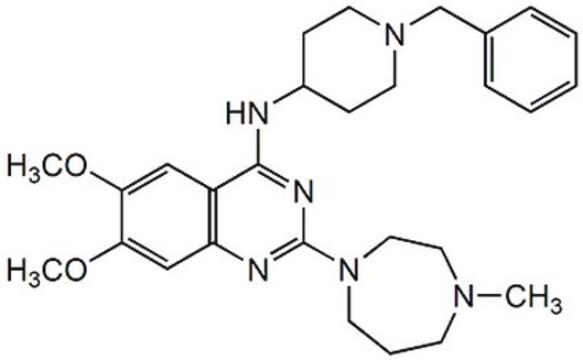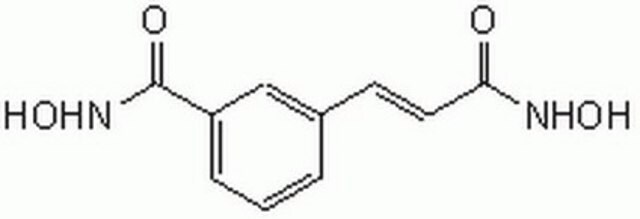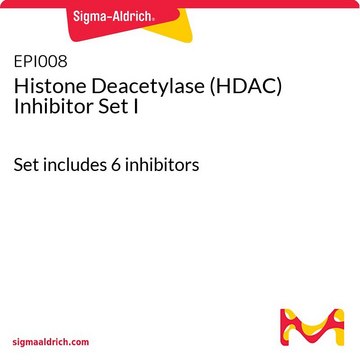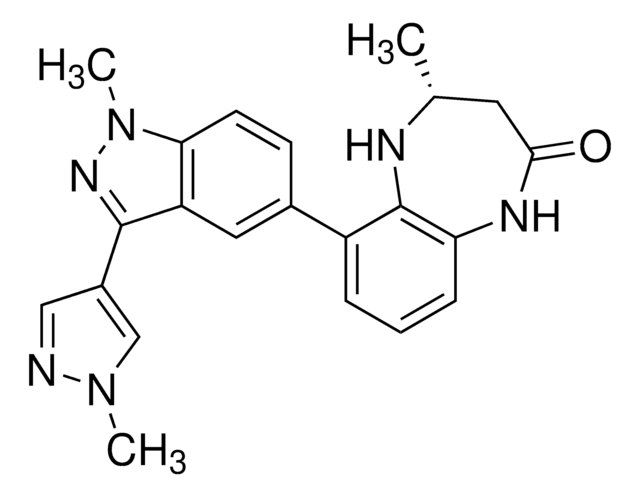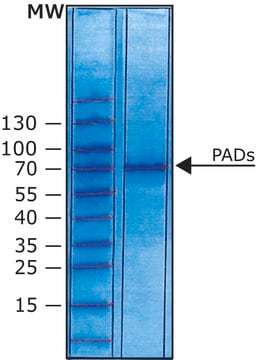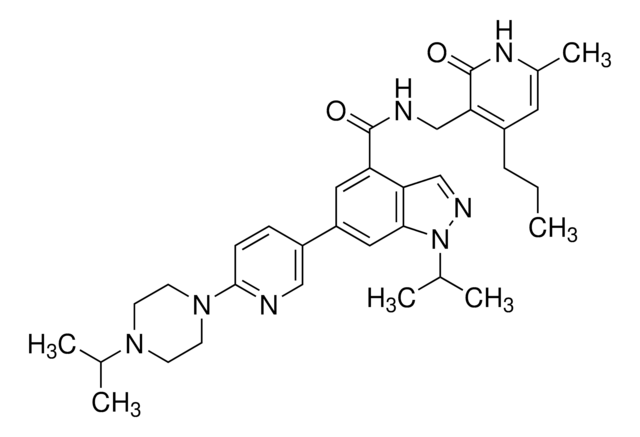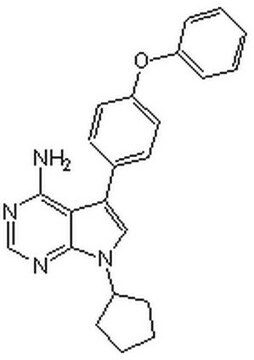SRP0329
PADI-4 human
recombinant, expressed in baculovirus infected Sf9 cells, ≥65% (SDS-PAGE)
Sinónimos:
Peptidyl arginine deiminase, type IV
Iniciar sesiónpara Ver la Fijación de precios por contrato y de la organización
About This Item
Código UNSPSC:
12352200
NACRES:
NA.32
Productos recomendados
origen biológico
human
recombinante
expressed in baculovirus infected Sf9 cells
Ensayo
≥65% (SDS-PAGE)
Formulario
aqueous solution
mol peso
75 kDa
envase
pkg of 10 μg
Nº de acceso NCBI
Nº de acceso UniProt
Condiciones de envío
dry ice
temp. de almacenamiento
−70°C
Información sobre el gen
human ... PADI4(23569)
Descripción general
PADI4 (peptidyl arginine deiminase 4) gene is localized to human chromosome 1p36, and is one of the four PADIs found in humans. PADI4 protein is composed of 663 amino acids encoded by 2238 base pairs of PADI4 cDNA. This protein is expressed in peripheral blood CD3+ T cells, CD20+ B cells, CD15+ neutrophils and CD68+ monocytes. It is expressed in haematopoietic tissues, such as spleen, thymus, peripheral blood leucocytes, fetal liver and bone marrow.
Aplicación
Useful for the study of enzyme kinetics, screening inhibitors, and selectivity profiling.
Acciones bioquímicas o fisiológicas
PADIs (peptidyl arginine deiminases) are responsible for the post-translational conversion of peptidylarginine to citrulline, in the presence of calcium ions. Citrullination can result in changes in conformational and functional characteristics of target proteins. In individuals with rheumatoid arthritis (RA), this gene is expressed in hematological cells and synovial tissues, and variant in this gene is linked with susceptibility to RA. The expression of this protein is linked with DNA hypermethylation in acute promyelocytic leukemia (APL), and PAD4/SOX4/PU.1 signaling pathway plays a role in committed differentiation of APL cells into granulocytic cells.
Código de clase de almacenamiento
10 - Combustible liquids
Clase de riesgo para el agua (WGK)
WGK 3
Punto de inflamabilidad (°F)
Not applicable
Punto de inflamabilidad (°C)
Not applicable
Elija entre una de las versiones más recientes:
Certificados de análisis (COA)
Lot/Batch Number
¿No ve la versión correcta?
Si necesita una versión concreta, puede buscar un certificado específico por el número de lote.
¿Ya tiene este producto?
Encuentre la documentación para los productos que ha comprado recientemente en la Biblioteca de documentos.
Lise Boon et al.
Matrix biology : journal of the International Society for Matrix Biology, 95, 68-83 (2020-11-07)
Matrix metalloproteinases (MMPs) are enzymes with critical roles in biology and pathology. Glycosylation, nitrosylation and proteolysis are known posttranslational modifications (PTMs) regulating intrinsically the activities of MMPs. We discovered MMP citrullination by peptidyl arginine deiminases (PADs) as a new PTM.
Functional haplotypes of PADI4, encoding citrullinating enzyme peptidylarginine deiminase 4, are associated with rheumatoid arthritis.
Suzuki A et al
Nature Genetics, 34(4), 395-402 (2003)
Rachida Nachat et al.
The Journal of investigative dermatology, 124(2), 384-393 (2005-01-29)
Post-translational conversion of arginine to citrulline residues is catalyzed by peptidylarginine deiminases (PAD). Although the existence of five isoforms of PAD has been reported in rodents and humans, their tissue distribution, substrate specificity, and physiological function have yet to be
A novel PAD4/SOX4/PU.1 signaling pathway is involved in the committed differentiation of acute promyelocytic leukemia cells into granulocytic cells.
Song G et al
Oncotarget, 7(3), 3144-3157 (2016)
Localization of peptidylarginine deiminase 4 (PADI4) and citrullinated protein in synovial tissue of rheumatoid arthritis.
Chang X et al
Rheumatology (Oxford, England), 44(1), 40-50 (2005)
Nuestro equipo de científicos tiene experiencia en todas las áreas de investigación: Ciencias de la vida, Ciencia de los materiales, Síntesis química, Cromatografía, Analítica y muchas otras.
Póngase en contacto con el Servicio técnico
